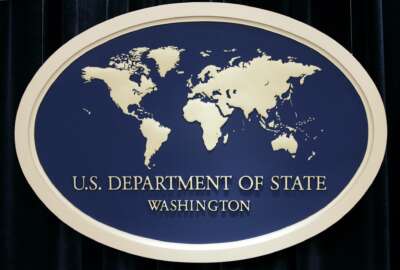To listen to the Federal Newscast on your phone or mobile device, subscribe in PodcastOne or Apple Podcasts. The best listening experience on desktop can be found using Chrome, Firefox or Safari.
- Telework limitations rank high up on the Pandemic Response Accountability Committee’s list of federal agency challenges during the pandemic. The National Reconnaissance Office allows some employees to complete unclassified work remotely. But its inspector general warns telework increases the risk of adversaries getting ahold of classified or sensitive information. Meanwhile the Treasury Inspector General for Tax Administration says the IRS faces challenges getting training and equipment to teleworking employees and keeping its tax-help phone lines running.
- More agencies are bringing their employees back to the office. Political appointees and career senior executives are expected to return Labor Department offices June 22. A Labor spokeswoman says face coverings and masks will be required while inside Labor buildings, elevators and common spaces until further notice. Labor is encouraging supervisors to continue reasonable accommodations for their employees. Meantime, the National Geospatial-Intelligence Agency will have half of its workforce back at the office by June 29. An quarter of the NGA workforce returned to their physical office spaces earlier this month. (Federal News Network)
- The State Department faces longstanding issues with its diversity initiatives. Former ambassadors tell members of the House Foreign Affairs Committee to consider elevating the State Department’s chief diversity officer to report directly to the deputy secretary’s office. They also told lawmakers that the State Department should include “inclusion promotion” among the necessary skills for agency employees to move up the ranks in the civil and foreign service. The Government Accountability Office earlier this year reported racial and ethnic minorities were less likely to receive promotions than their white counterparts. (Federal News Network)
- Temporary coronavirus loan options are now available from the Thrift Savings Plan. Participants can take a loan of up to $100,000 up from the typical $50,000. TSP’s regular loan rules still apply. And participants can only have one general purpose loan at one time. Participants have until September 18th to apply for a special coronavirus loan. Participants can also apply to suspend their usual loan payments through 2020. Only those who have been diagnosed with COVID-19, or experienced adverse financial hardships are eligible for these options.
- Five House committee chairmen are demanding the Small Business Administration to stop blocking the Government Accountability Office from performing oversight of the Paycheck Protection Program. The lawmakers wrote to SBA Administrator Jovita Carranza claiming that over the past two months the agency has obstructed GAO from conducting interviews, obtaining documents and collecting data about the $513 million relief program. The chairmen say SBA is trying to avoid oversight and accountability of the CARES Act program.
- The Government Accountability Office has denied a second protest of the Navy’s Next Generation Enterprise Network contract. Perspecta, the incumbent for NGEN, had claimed Leidos got an unfair advantage when it hired a former government official while it was bidding on the contract. GAO disagreed. The decision comes a week after GAO denied a separate protest by GDIT. (Federal News Network)
- The Special Operations Command is considering two options to fill in its data science gaps. The U.S. Special Operations Command is seeking vendors to help develop and upgrade its Global Analytics Platform or GAP. SOCOM released a request for information detailing two lines of effort. One focuses on upgrading current capabilities with data science and artificial intelligence/machine learning technologies to improve analyst workflow. The second line of effort would support existing GAP capabilities while also enabling security, authentication, access control, collaboration, customization, and data flow in an elastic and scalable manner. Responses to the RFI are due July 31.
- The Defense Department is furthering space as a warfighting domain by releasing a strategy to keep its dominance over China and Russia. The new document establishes four lines of effort that include building U.S. military advantages in space, integrating space power into operations, shaping the strategic environment and cooperating with allies. U.S. Space Command and the Space Force will play a pivotal role in the strategy. DoD says it needs to protect its interests in space as U.S. technologies and weapons continue to rely on it. (Federal News Network)
- The defense space industry took a hit from coronavirus, according to a survey from the Defense Department. About half of the companies in the defense space industry say cash flow was moderately effected or worse by the economic fallout of the pandemic. Half of the companies also say they adjusted their business strategies for the next couple years and more than a third had schedule impacts on programs.
- The Commerce Department’s First Responder Network Authority is shelling out for investment in 5G capability. The FirstNet Board approved an expenditure of $218 million. Some of the money will add vehicles to the fleet of trucks, planes and balloons with cellular bandwidth. The rest will start to upgrade the existing 4G network so it will be ready for 5G, the next generation of wireless data transmission technology. The authority will spend the money as task orders under its long-term contract with AT&T.
- The Trump Administration has a new plan to address suicide among the nation’s veterans. The long-awaited 66-page plan was originally due to be released in March. Much of it would require action by Congress, but it calls for $53 million in spending over the next two years. The task force that developed the plan called new initiatives involving gun safety and barriers that could help prevent suicide at railroads and bridges. In the near term, the administration also plans a public messaging campaign to raise awareness about mental health challenges that can lead to suicide, especially during a period of social distancing. (Federal News Network)
Copyright
© 2025 Federal News Network. All rights reserved. This website is not intended for users located within the European Economic Area.




